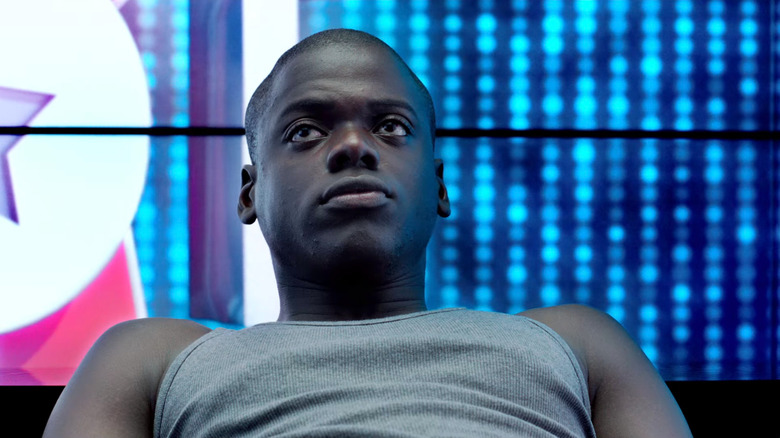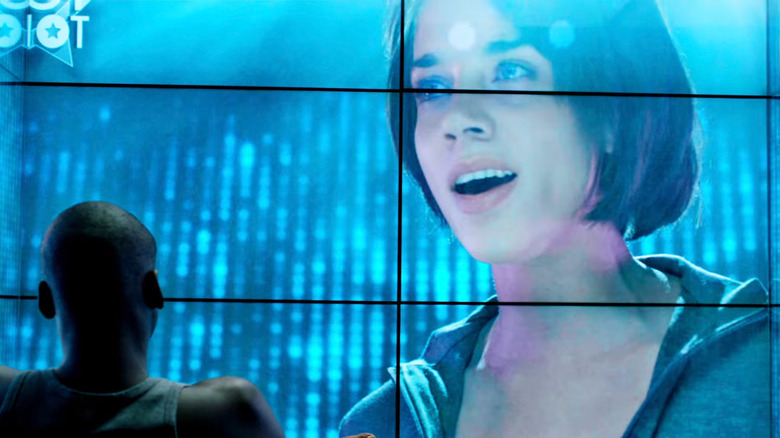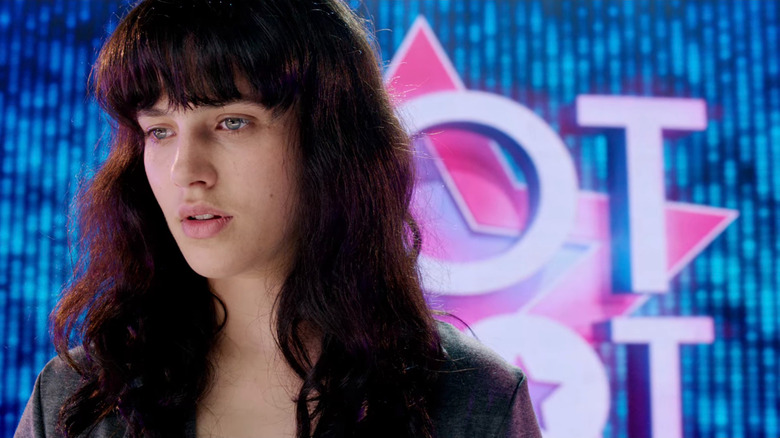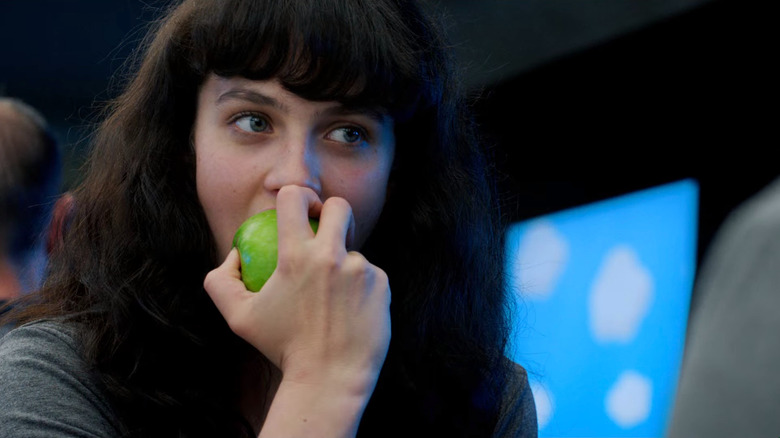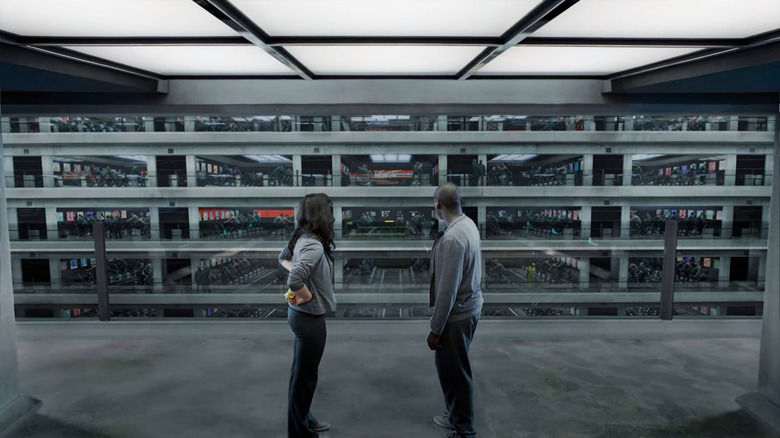The Daily Stream: Black Mirror's Fifteen Million Merits Might Get You To Reevaluate Your Priorities
(Welcome to The Daily Stream, an ongoing series in which the /Film team shares what they've been watching, why it's worth checking out, and where you can stream it.)
The Episode: "Black Mirror," season 1, episode 2, "Fifteen Million Merits"
Where You Can Stream It: Netflix
The Pitch: The official Netflix synopsis of "Fifteen Million Merits" is:
"After failing to impress the judges on a singing competition show, a woman must perform degrading acts or return to a slave-like existence."
The woman in question is Abi, played by Jessica Brown Findlay, who later co-starred in the Peacock adaptation of Aldous Huxley's "Brave New World," one of the great dystopian novels. Yet in some ways, Abi functions as more of an ideal for Bing (Daniel Kaluuya, pre-"Get Out" fame), who gives an impassioned speech in "Fifteen Million Merits" where he refers to Abi and her singing talent as "the one thing I ever came close to anything real about."
He's not the only one who objectifies her. Bing and Abi's dystopian love connection in "Fifteen Million Merits" has drawn comparisons to the central one in George Orwell's "1984," a book that's often taught right alongside "Brave New World" in schools. Where I grew up, though — in Florida — they're now pulling books from shelves and banning them at an alarming rate, so there's no telling how much longer it will be before school kids are living "1984" rather than reading about it.
Maybe we're already living it. It's been over a decade since "Fifteen Million Merits" originally aired on Channel 4 in the UK, giving viewers what /Film's Jacob Hall called "the first great episode of 'Black Mirror'" in his ranking of the show's first three seasons. If anything, it feels like the video walls have only closed in tighter since then.
Why it's essential viewing
As an anthology show, "Black Mirror" can be watched (or rewatched) out of order. Each episode tells a standalone story, and it only requires an hour of your time. As creator Charlie Brooker once wrote in The Guardian, "The series was inspired, indirectly, by 'The Twilight Zone,'" and, "The 'black mirror' of the title is the one you'll find on every wall, on every desk, in the palm of every hand: the cold, shiny screen of a TV, a monitor, a smartphone."
While many series rankings tend to favor "San Junipero" as the best "Black Mirror" episode, "Fifteen Million Merits" has always stuck with me, in part because of that ABBA earworm, "I Have a Dream," which we hear Hannah John-Kamen ("Ant-Man and the Wasp") performing. Her character is a pop star, lifted up as an example of a dream come true for the masses, after winning an "American Idol"-like talent show called "Hot Shot."
"Fifteen Million Merits" begins with a basic screenwriting no-no, the most overused story opening you'll ever see, whereby the protagonist — in this case, Bing — wakes up to his alarm. Yet the alarm is part of a wall of black mirrors in his high-tech room, which is really more of a claustrophobic cell. This is where Bing "lives," if you could call reluctantly watching porn and playing point-and-shoot video games in bed really living (in the "Ikiru" sense).
Commercials for "Hot Shot" interrupt Bing's gaming, and if he wants to skip them, it costs him credits. In fact, everything he consumes, even a small glob of toothpaste or hand soap, reduces his overall balance in real-time. This is just one aspect of the episode that has begun to feel even more relatable of late than it did back in 2011.
The writing on the wall (with ads)
If you've noticed an aggressive uptick in junk ads on social media in recent months, you're not alone. Bing is right there with you. I first noticed it when YouTube started adding unskippable ads to the beginning of every video. A recent report in The New York Times indicated that "a slowdown in the overall digital ad market" online has created an opening for lower-quality ads, which are "increasingly inescapable." The irony is, the Times article itself is interrupted at various points by random ads. You might be seeing some even as you're reading this.
Bing — who, lest we forget, shares a name with a search engine — was dealing with such ads in "Fifteen Million Merits" before buying Twitter was even a twinkle in Elon Musk's eye. He inhabits a corporate dystopia where people hamster themselves on exercise bikes to earn credits to live. To quote "Cabaret," "Money makes the world go round."
The episode never elaborates on how people's cycling is useful to society, so the viewer can only surmise that maybe it's like a semi-consensual version of "The Matrix," where they're being used as human batteries to power the capitalist machinery that keeps the whole thing running. The grey conformity of their sweatsuits renders each person a simple cog in the machinery. The individuals around Bing, his neighbors or coworkers, are easily replaceable: here one day, gone the next. They have limited interactions, but most of the time, they sit face forward at their wheeled workstations, losing themselves to inane distractions like the show "Botherguts," which seems to consist solely of hosing down heavy-set people, degrading them for sport.
Into this environment wanders Abi and her angelic singing voice, which Bing latches onto as his vicarious ticket out of cycling limbo.
The Garden of Orwell
"Fifteen Million Merits" was co-written by Charlie Booker and his wife, Kanak Huq, and when Bing and Abi sit down in the cafeteria and have their first real conversation, it's as if we're watching another famous couple, Adam and Eve, conceive of a way to escape the bizarro Garden of Orwell. Abi even chews on a green, vending machine apple, illustrating in a forward manner the taste of knowledge that trying out for "Hot Shot" offers. Yet even as they dare to dream that leaving their prison behind might be a possibility, the lyrics to that Abba song linger in memory, painting the dream as a form of denial, a mere coping mechanism or "fantasy to help [them] through reality."
"Hot Shot" has brainwashed them into thinking anyone can be the next idol. But from the minute Abi turned up on Bing's cycling floor (which is one among many), the world was already looking to grind her down and break her spirit. Bing's crass bike neighbor takes one look at her and says lasciviously, "I'd love to f****ng ruin that." This is the same guy who talks down to the overweight cleanup crew, lording his position in the dystopian hierarchy over them, ignorant that it's just using him to sustain itself while the audience looks down on him.
Bing has a dream, but so does everyone else. Still, he's willing to bet it all on Abi, buying a Willy Wonka-esque golden ticket and gifting it to his muse. Before she's ushered out on stage, Abi has to drink compulsory "Cuppliance," which leaves her drugged and ready to comply as the panel of judges humiliates her on live TV by asking her to take her top off. As Barry Keoghan might say, "There goes that dream."
Stationary bikes
"Fifteen Million Merits" shows the image of a cracked mirror like the one in the "Black Mirror" logo, as Bing, desperate for some peace and quiet in the panopticon, lashes out against the walls confining him. It's easy, we see, to rail against the system. The system itself may even be induced to commodify that, choosing a stereotypical Angry Black Man at random from the waiting room because it needs "an ethnic one," then giving him a platform to rant on cue.
It's done something like that already with "Black Mirror," which is but one of many shows in a sea of glittering Netflix distractions. Witness how all 15 million merits can be earned in a simple montage in this episode.
You can watch it like the red-headed guy, just for escapism, or you can learn from it and think twice next time before you shave any more credits — time or money — off your life for something that's not worth the expenditure. In The Guardian, Charlie Booker described the episode's setting as "a world in which the population is apparently doomed to a life of meaningless toil enlivened only by continual entertainment." It's not so different from a world where consumers willingly become indentured servants to debt, all in the name of liberty and the pursuit of happiness.
Bing soapboxes about how we're "medicated against shame with pleasure." The alternative, perhaps, is to let go of outward resentment and take personal responsibility for one's own failures and shame, realizing that some things are beyond your control and the system may be rigged against you. Maybe, in the end, the true "system" is just the part of our brains that keeps us pedaling on stationary bikes, reaching for the carrot that's dangling in front of us to no avail.
